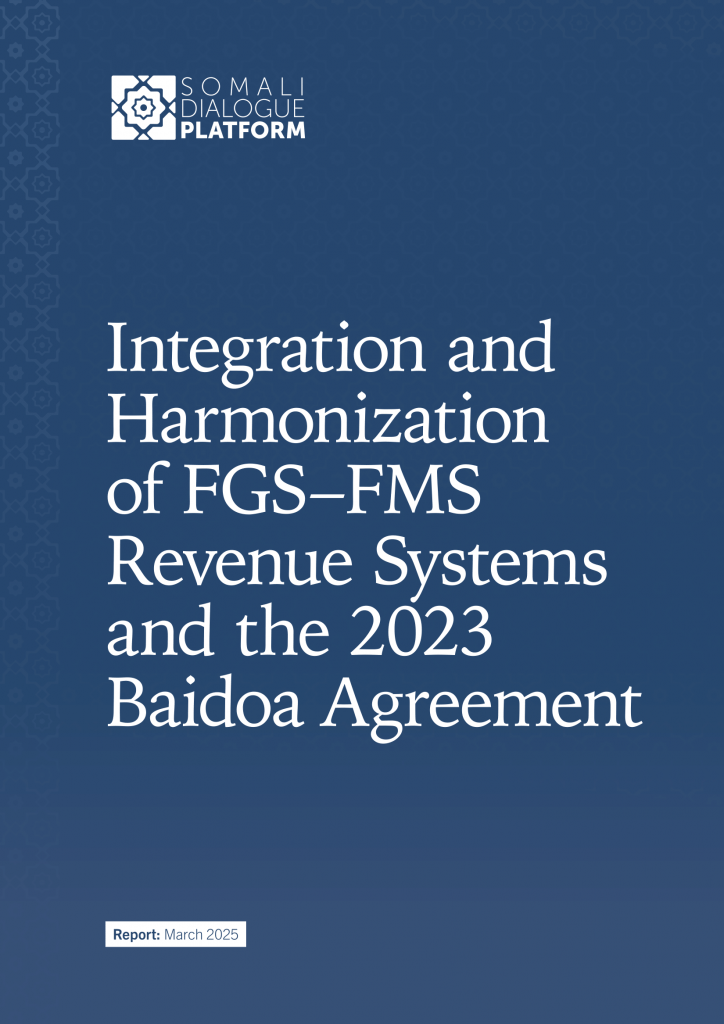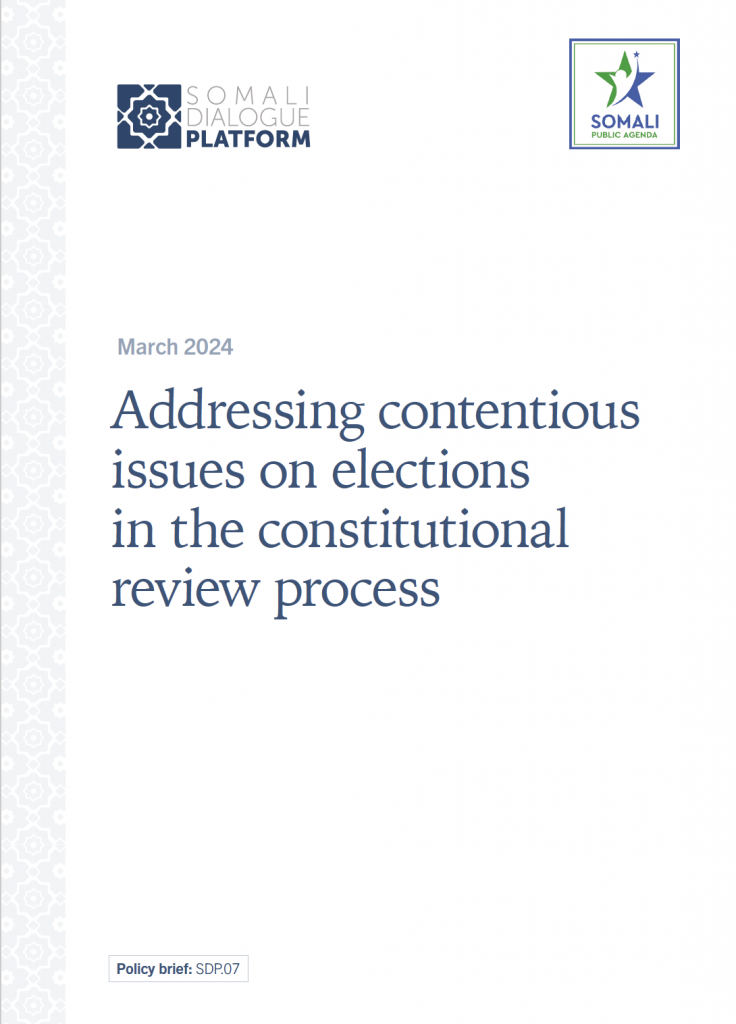Integration and Harmonization of FGS–FMS Revenue Systems and the 2023 Baidoa Agreement

Tax revenue collection in Somalia has, during the past decade, been hampered by—among other things—weak institutional capacity, lack of sound tax administration systems and a fragmented administrative structure that has often placed the Federal Government of Somalia (FGS) at odds with Federal Member States (FMSs). Despite these limitations, however, Somalia’s domestic revenue tax mobilization reform […]
Addressing contentious issues on elections in the constitutional review process

Introduction On 27 May 2023, Somalia’s National Consultative Council (NCC) agreed on elections at both a federal and state level.1 Unified local council elections were envisaged to start at district-level elections across all Federal Member States (FMSs) in June 2024, and state-level parliamentary and presidential elections in November 2024. Political parties, as per the agreement, […]
The Shaping of the Somali National Security Architecture
Executive summary This policy paper assesses the revised National Security Architecture (NSArch) in Somalia, pinpointing critical deficiencies and presenting policy recommendations to fortify the national security framework. Central to this analysis are questions surrounding the effectiveness of the NSArch, its reception among Federal Member States (FMSs) and the evolving role of the Macawisley (informal local […]
THE CONSTITUTIONAL AMENDMENT PROCEDURE: ANALYSIS OF THE PROCESS AND THE ROLE AND PARTICIPATION OF THE CIVIL SOCIETY
On 24 January, Somalia’s Federal Parliament approved the ‘Adoption Procedure for Constitutional Amendment’ in a joint session of the House of the People and the Upper House. The five-page procedure consists of eight articles. Articles three, four, and five detail the three phases of the constitutional review and ratification process. The Independent Constitutional Review and […]
SUURAGALMINADA DHISMAHA GOLEYAASHA DEGMOOYINKA IYO DIMUQRAADIYEYNTA MAAMULKA GOBOLKA BANAADIR
Soo koobid Find the English version of this briefing here.
PROSPECTS FOR DISTRICT COUNCIL FORMATION AND DEMOCRATIZATION IN BANADIR REGIONAL ADMINISTRATION
Summary Find the Somali version of this briefing here.
MA’AWISLEY: A DOUBLE-EDGED SWORD IN THE FIGHT AGAINST AL-SHABAAB
Introduction One of the most significant recent developments in the prolonged struggle against al-Shabaab in Somalia has been the success of military operations led by the Somali National Armed Forces and allied self-defence militias known as Ma’awisley. Ma’awisley—named after the colourful sarong many members wear—were provoked into action by various grievances towards al-Shabaab, including high taxation, […]
ENABLING WOMEN’S REPRESENTATION AND PARTICIPATION IN POLITICAL DIALOGUES IN SOMALIA
SUMMARY Somalia grapples with unique cultural, societal, and structural hurdles that hinder women’s access to political processes. Despite introducing a non-legally binding quota, the most recent federal elections in 2022 saw a decline in women’s parliamentary representation. Beyond this, women’s leadership in public spaces remains inadequate at all levels. Patriarchal norms, gender stereotypes, and cultural […]
EXPANDING PUBLIC PARTICIPATION IN POLITICAL PROCESSES IN SOMALIA
Summary In recent history, political processes in Somalia have been dominated by a narrow set of political and business elites, armed actors and external players. Following the collapse of the government in 1991, there were a series of conferences in the 1990s that engaged primarily with political elites and armed actors. All of these conferences […]
HESHIISKA SIYAASADEED EE DOWLAD-GOBOLEEDKA GALMUDUG
Hordhac Galmudug ayaa ilaa iyo dhawaanahan loo arkayay dowlad-goboleed ay colaado iyo kala qeybsanaan badani ka jiraan, oo ay qaabeeyeen colaadihii laga dhaxlay dagaalladii sokeeye ee Soomaaliya. Khilaafyada joogtada ah ee beelaha ku saleysanaa ee u dhexeeyay kooxaha siyaasadeed awgood, waxaa lagu sifeeyay in aysan ka jirin awood siyaasadeed oo mideysan. Xitaa iyadoo gobollada kale […]
